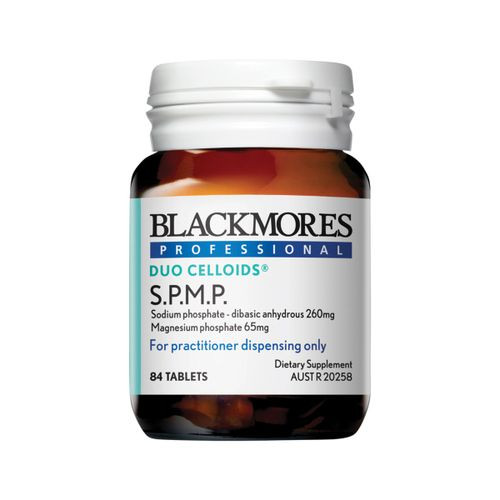Combines sodium phosphate and magnesium phosphate in a single tablet.When prescribed by a healthcare professional S.P.M.P. is generally well tolerated at the recommended dose and may be prescribed for infants, children, pregnant and lactating women, and the elderly.The easy-to-swallow tablet can be halved or crushed to facilitate low-dose prescribing for infants and children.Prescribing InformationSodium and phosphate are involved in the regulation of extracellular fluid and pH. Magnesium and phosphate are vital for energy production, and help fuel nearly all cellular processes, including muscle function and nerve conduction.Neuromuscular function: Magnesium has inhibitory and stabilising effects on neurons at the neuromuscular junction and plays an influencing role in the release of neurotransmitters.Acid-base balance: One of the body's important mechanisms for maintaining intracellular acid-base balance is the phosphate buffer system, in which sodium monohydrogen phosphate and sodium dihydrogen phosphate act as efficient buffers in acid and alkaline conditions respectively.
Combines sodium phosphate and magnesium phosphate in a single tablet.When prescribed by a healthcare professional S.P.M.P. is generally well tolerated at the recommended dose and may be prescribed for infants, children, pregnant and lactating women, and the elderly.The easy-to-swallow tablet can be halved or crushed to facilitate low-dose prescribing for infants and children.Prescribing InformationSodium and phosphate are involved in the regulation of extracellular fluid and pH. Magnesium and phosphate are vital for energy production, and help fuel nearly all cellular processes, including muscle function and nerve conduction.Neuromuscular function: Magnesium has inhibitory and stabilising effects on neurons at the neuromuscular junction and plays an influencing role in the release of neurotransmitters.Acid-base balance: One of the body's important mechanisms for maintaining intracellular acid-base balance is the phosphate buffer system, in which sodium monohydrogen phosphate and sodium dihydrogen phosphate act as efficient buffers in acid and alkaline conditions respectively.



 Gain access now
Gain access now